Food for thought; Sunnyside Guest House Southport Sustainable Food Story.
At Sunnyside, our dedication to reducing our carbon footprint has been an ongoing journey over the past few years. Acknowledging that food production and consumption contribute to approximately 30% of global carbon emissions, we have taken a closer look at how we can measure and mitigate our impact.
Source locally and reduce food miles
A significant step we’ve taken is embracing the idea of sourcing locally. By forging strong relationships with nearby farmers and suppliers, we’ve been able to access some of the finest ingredients that our region has to offer. Situated in the North West, we are fortunate to have an abundance of high-quality produce cultivated by passionate farmers right on our doorstep.

To find out more about the amazing local farms and businesses that supply us please check out the Sunnyside’s local suppliers page.
Seasonal Food
While eating local food can reduce your carbon footprint and impact upon the environment, there is an important caveat to remember. While the food miles of locally grown food is lower, the way in which its grown can have the greatest impact on the “foodprint” of your dish
Take strawberries for example: a 250g punnet of strawberries that have been grown in a [heated] greenhouse can have a footprint seven times higher than its in-season counterpart. Check out the foods that are currently in season using the Eat the Seasons website. The wrap scope 3 GHG Measurement and Reporting Protocols for Food and Drink can be an invaluable source for those wanting to delve further into the “foodprint” values for each ingredient they use. The Earth Day website also contains a list of foodprint calculators that could be helpful.
Home-made food has a positive impact on our guests health and the environment
In our efforts to maximize the quality of our dishes, we’ve taken the initiative to produce a range of home-made items, including jams, yogurts, ketchup and baked goods.

Furthermore, we have been training to become beekeepers over the last 12 months and recently established our own beehive which allows us to play our part to help maintain the local ecosystem and also provide our guests with our Sunnyside honey.
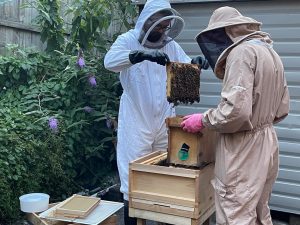
Making our own home-made food has empowered us to make informed choices regarding the ingredients we use. By doing so, we can steer clear of additives, preservatives, and artificial flavors commonly found in processed foods. Additionally, this approach has led to a significant reduction in packaging waste, especially single-use plastic. We have adopted reusable glass jars for packaging our home-made jams and yogurt, while our tomato sauce is stored in reusable containers and as a result we have been awarded the Surfers Against Sewage Plastic Free Communities Business Champion Award.
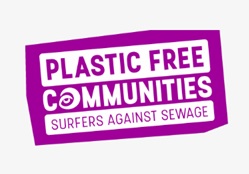
Less meat, dairy and eggs
In general, fruit and vegetables have lower greenhouse gas emissions compared to animal products such as beef and dairy, in fact as much as 10-50 times lower.

Additionally, the production of plant-based ingredients generally requires less land, water, and energy resources compared to animal-based alternatives. By choosing plant-based dishes, our guests actively contribute to a more sustainable food system and support the reduction of overall environmental strain.
As a result we’ve tried to extend the range of plant-based dishes and looked at ways to entice the guest into ordering them. We’ve been working on our new plant-based menu which offers options such as our home-made, plant-based pancakes and plant based omelets. As the ingredients used don’t contain meat and dairy we’ve often found have a much longer shelf life which helps reduce food waste.
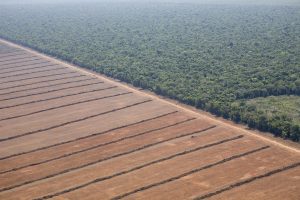
We have also sourced our pork from local suppliers, however it must be noted that pigs consume large quantities of corn and soya bean meal and according to the WWF “Globally, beef and soy are the leading drivers of tropical deforestation and conversion of other habitats.”
Go Organic
Organic farming practices, whether applied to crops or animals, reduce their environmental impact compared to conventional methods. Organic-certified farms are required to employ natural techniques for soil enrichment, weed management, and pest control.
Pesticides particularly have a negative impact upon pollinators such as bees. The use of neonicotinoid pesticides has been approved again for 2023 by the government for a third year in a row despite their own experts, recommending that the authorization should not go ahead. According to the Wilelife Trusts a single teaspoon of this type of chemical can kill 1.25 billion honeybees, enough to fill four lorryloads.
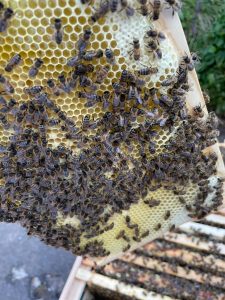
Furthermore, the use of antibiotics and growth hormones is prohibited in the raising of food animals in organic farming, adhering to strict standards of animal welfare that ensure humane treatment of livestock.
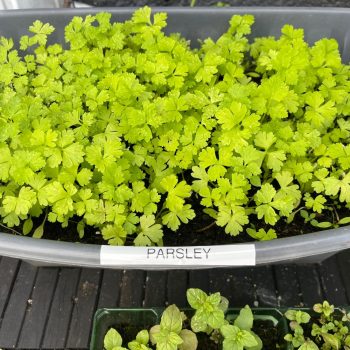
We are lucky enough to have Flavourfresh on our doorstep. They provide us with some soil association organic produce. We have also been growing some of our own parsley, chives and mint without the use of chemicals or pesticides. We hope to build upon this next year as we are keen to grow blueberry’s and blackcurrants to serve at breakfast.
Reduce food waste
At the begging we felt food wasnt wasn’t an issue at the Sunnyside. We take pre-orders for breakfast the night before which has a big impact on keeping food waste to a minimum. When we discovered that every kg of food wasted, you are also throwing away, on average the carbon equivalent of 3.39kg (According to WRAP) we decided to investigate further.
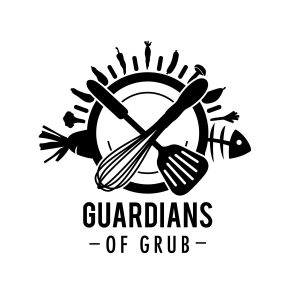
“If food waste was a country, it would be the third largest emitter of greenhouse gases after China and the US.”
We decided to join the Guardians of Grub food waste reduction programme. In a nutshell we had to split our food waste into four categories; preparation, spoilage, plate and other.
We put the waste into buckets, recorded the weight each day and looked at how we could adjust our practices. This process is simple but also very effective. We noticed our biggest issue was with plate waste. I felt our enthusiasm to provide the guest with an enjoyable stay meant we were guilty of trying to overfeed them. As a result, one of the first steps we took was to offer two portion sizes for the most popular dish on the menu, the Full English. We now offer a standard and large Full English which has seen a significant reduction in waste with the vast majority of guests selecting the standard Full English. We also reduced the amount of toast we provide to guests in the morning and changed how and when we purchase food and store it. These changes have seen our food waste reduce by between 30-35%.
As we moved away from cheaper supermarket food toward high quality locally produced food we noticed a significant increase in our shopping bill. Reducing food waste not only reduced our carbon footprint, it also helped reduce our rising food costs.
There are many ways in which you can reduce your food waste, regardless whether you are a big hotel or small B&B. Even something as simple as a sign can have a big impact in reducing food waste and gaining the respect of your customers.
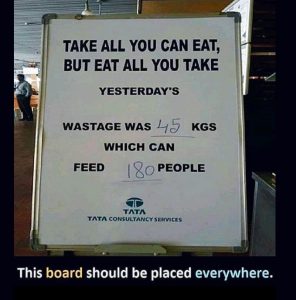
When food such as our home-made cupcakes isn’t consumed we donate it to the Southport Soup Kitchen who then distribute it to the needy. We also make fresh batches of cakes for them when our ingredients such as flour and eggs come close to their expiry date. This helps reduce food waste and provide someone with a meal that may be struggling.
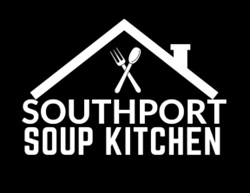
Ethical Purchasing
Auditing the supply chain for the Sunnyside Guest House was a crucial step towards becoming an ethical, sustainable, and responsible business. Its also an absolute minefield. I found there is so much greenwash which makes it very difficult to work out which companies can really be trusted. The terminology use can often be very confusing which makes it very hard to make the right choices.

I began e-mailing the companies in the supply chain asking questions such as; do they use sustainable palm oil in their products and are their chemicals tested on animals. Sometimes websites can be informative but it can also be easy to get lost in the terminology and its very time consuming. After many nights of trying to get my head round it all I discovered the Ethical Consumer Magazines Buyers guides. As a small business that’s time poor I found this as an amazing resource. Reading through the guides, I quickly discovered many of the existing products on my hospitality tray such as the Twinings Fruit teas, PG tips, Nescaffe coffee sticks and hand soaps were very low on Ethical Consumers rankings.
The Ethical consumer magazine ranks companies and their products based; how it impacts the environment, workers rights, sustainability, company ethos and issues such tax avoidance. They sort through whether the suppliers use certified; Sustainable palm oil, fair trade, soil association organic, cruelty free and Vegan to name but a few.
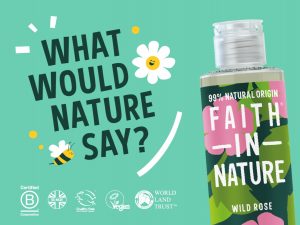
If you go for the highest rated products on the list your budget can go quite quickly, however I found it is possible to adjust many of the items we currently purchase for high quality and more sustainable products without it costing us more money. We did however find new suppliers for coffee, soaps and shower gels that were substantially more expensive than we were already paying, however with the knowledge we had gained we felt that despite the extra cost they provided excellent value as we wanted the best for both the environment and our customers.
While you have to pay for a subscription to the Ethical Consumer Magazine other free tools are available such as the Impact Score app.
Food for the planet
If you are a food business, commit to serve more plants, better meat and freshly prepared food from ingredients sourced locally and you are looking to do so in a structured way, we suggest taking the “for the planet pledge”. This campaign has been set up by charity Sustain.
